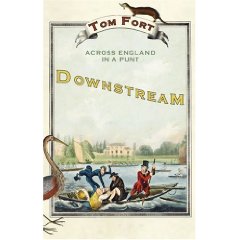
Nicholas Lezard on Tom Fort’s journey down the River Trent (from yesterday’s Guardian);
I had, ever since reading his The Book of Eels, known Tom Fort had a thing about rivers; so it seems logical that he has come to write this. And rivers are amazing: bringers of life, their sources sometimes mysterious, their journeys winding, ideally abundant. You never step into the same one twice, of course, and, as the poet of Ecclesiastes had it, showing an early grasp of the circulation of water, “all the rivers run into the sea; yet the sea is not full: unto the place from whence the rivers come, thither they return again”. (Actually, you will learn from here that it took a very long time for people to work out the hydrological cycle. You have to wait until the end of the 17th century and the brilliant mind of Edmund Halley.)
Travelling on the river, as Fort observes, liberates one from the constraints of the earth; it gives you a different perspective, and the chief joy of this book is sharing that perspective. This is not some waggish attempt to recreate some kind of Edwardian, Jeromian comic idyll, or evoke the hazy sentiment of The Wind in the Willows (“messing about in boats” and all that); it is a solitary attempt to come to terms with the third-longest river in England.
I am not sure why Fort chose the Trent, except for the fact that it is not an obvious choice. There is little glamour about it; towards the end of the book, he says: “My long ride had taken me across one of the least known and – the truth must be told – dullest tracts of countryside in England.” But that, in itself, has its advantages, for it means he can digress on the history that so often springs up on its banks, and as the river makes its J-shaped way through Stoke, Derby, Burton and Nottingham, we get to hear about bits of history that tend to get overlooked.
The book, very properly, meanders (from the river Maeander, “proverbial for the tortuousness of its course across the plain of Phrygia”), and successive pages can have you skipping back and forth through time. We learn about the flitch of bacon awarded by the lords of the manor of Wychnor, given to any married couple who could prove they had not argued for a year and a day (“claimants for the Wychnor flitch were few and far between. One couple who lay their hands on it immediately began arguing about how it should be cooked, and were forced to give it back”). We learn about the incredible gambling habits of the Marquess of Hastings, ruined finally in 1867 by a bet of £120,000; about the very first Bramley apples – the first tree to produce them is, amazingly, still doing so; about Mary Chaworth, who was beloved of Byron but initially scorned him because of his foot, only to try to wheedle her way back into his affections when her dashing husband ill-used her (Byron, by that time the most famous poet in England, quite properly scorned her). We learn about the riots in Nottingham which started when the Lords threw out the reform bill of 1831, and that city’s reluctance to support Charles I. We also learn, although Fort does not go into town to verify the assertion for himself, that “Rugely is full of wankers”.
It is a paradoxical story, this, of decline and rebirth; the industries die, and the rivers become alive again. Burton-on-Trent, home to some of the best brewers in the world, manifests its own poignancy in the fact that the Bass Museum of Brewing is now the Coors Museum of Brewing. It is fitting that Fort likes his beer (he normally has “four or five” pints when he gets the chance – rowing all day is thirsty work, and it would have been thirstier work if he’d used a pole), and is a connoisseur of pubs; sadly, there are some stinkers along the way.
One cannot pretend this is an exciting book. That’s the very point. It goes at the pace of the river current, it takes its time; it is undemanding and rewarding, like the best kind of river holiday. Underneath it all is a gentle melancholy, a deep feeling for what has been lost, and what has been reclaimed. Its soul, like that of a river, is beneath the surface.
Tom Fort, ‘Downstream: Across England in a Punt’ available from The Guardian bookshop